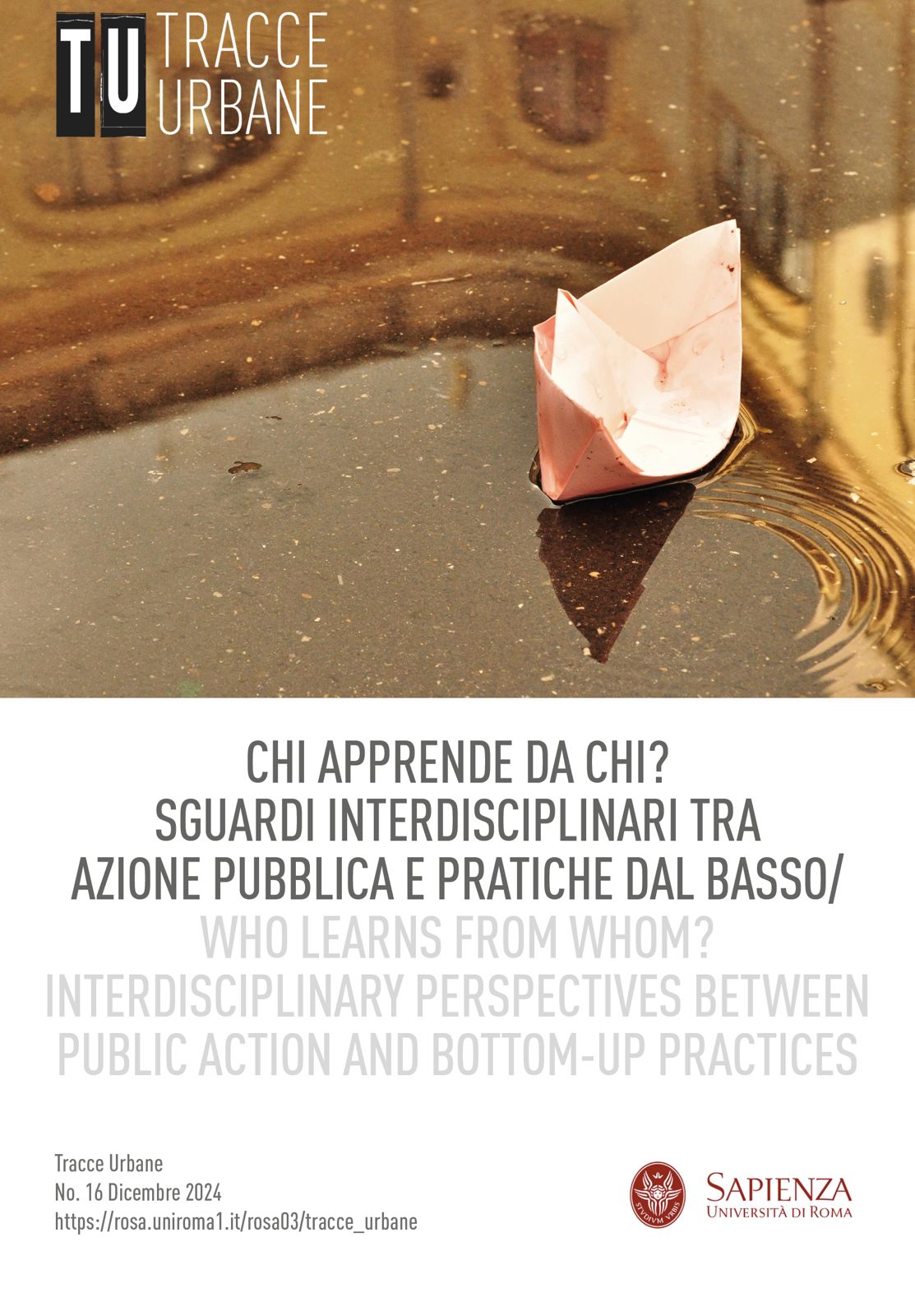Intraprendere la costruzione di luoghi terzi
DOI:
https://doi.org/10.13133/2532-6562/18886Parole chiave:
luoghi terzi, potere istituente, istituzioniAbstract
Il contributo esplora il concetto di “luoghi terzi”, contesti concreti dove iniziative dal basso e poteri pubblici si incontrano, evitando la neutralizzazione istituzionale e generando valore pubblico. A partire dall’esperienza della “carovana dell’intrapresa sociale”, si analizza il superamento del dualismo tra movimenti e istituzioni, mostrando come il confronto possa evolvere in relazioni costruttive. I “luoghi terzi” emergono dalla trasformazione di spazi in contesti vivi, attraverso criteri che pongono al centro le persone, con particolare attenzione ai più vulnerabili, e che promuovono alleanze innovative. Questi processi aperti, in continua evoluzione, rafforzano la funzione pubblica condivisa e il potere istituente. Si sottolinea infine come il lavoro di conoscenza, riflessivo e situato, contribuisca alla costruzione di questi luoghi, offrendo risposte alle sfide della frammentazione sociale e istituzionale.
Riferimenti bibliografici
Arendt H. (1958). The Human Condition. University of Chicago, Chicago, US (trad. it.: Vita activa. La condizione umana. Milano: Bompiani, 1964).
Berger J., Roy A., Nadotti M. (2010). La speranza, nel frattempo. Torino: Casagrande.
Castel R. (2008). La discriminazione negativa. Cittadini o indigeni?. Macerata: Quodlibet.
De Leonardis O. (2020). «Quantifying Inequality. From Contentious Politics to the Dream of an Indifferent Power». In: Mennicken A., Salais R., Eds., The New Politics of Numbers. London: Palgrave.
Didi-Huberman G. (2009). Survivance des lucioles. Paris: Les Éditions de Minuit, (trad. it., Didi-Huberman G. (2010). Come le lucciole. Una politica delle sopravvivenze. Torino: Bollati Boringhieri).
Ginzburg C. (2018). Nondimanco. Machiavelli, Pascal. Milano: Adelphi.
Gotor M. (2022). Generazione settanta. Torino: Einaudi.
Graeber D. (2012). Debito. I primi 5000 anni. Milano: Il Saggiatore.
Mouffe C. (2005). On the Political. London-New York: Routledge.
Sen A. (1985), «Well-Being, Agency and Freedom: The Dewey Lectures 1984». The Journal of Philosophy. 82 (4): 169–221.
Sen A. (1995). Inequality Reexamined. Oxford: Clarendon.
Sen A. (2009). «Capability: Reach and Limit». In: Chiappero Martinetti E., a cura di, Debating Global Society: Reach and Limits of the Capability Approach, 15–30. Milano: Fondazione Giangiacomo Feltrinelli.
##submission.downloads##
Pubblicato
Come citare
Fascicolo
Sezione
Licenza
Copyright (c) 2024 Ota De Leonardis

TQuesto lavoro è fornito con la licenza Creative Commons Attribuzione 4.0 Internazionale.
NOTA DI COPYRIGHT
Proposta di licenza Creative Commons
1. Proposta per riviste Open Access
Gli autori che pubblicano su questa rivista accettano le seguenti condizioni:
Gli autori mantengono i diritti sulla loro opera e cedono alla rivista il diritto di prima pubblicazione dell'opera, contemporaneamente licenziata sotto una Licenza Creative Commons - Attribuzione che permette ad altri di condividere l'opera indicando la paternità intellettuale e la prima pubblicazione su questa rivista.
Gli autori possono aderire ad altri accordi di licenza non esclusiva per la distribuzione della versione dell'opera pubblicata (es. depositarla in un archivio istituzionale o pubblicarla in una monografia), a patto di indicare che la prima pubblicazione è avvenuta su questa rivista.
Gli autori possono diffondere la loro opera online (es. in repository istituzionali o nel loro sito web) prima e durante il processo di submission, poiché può portare a scambi produttivi e aumentare le citazioni dell'opera pubblicata (Vedi The Effect of Open Access).


